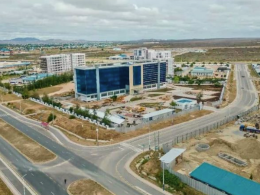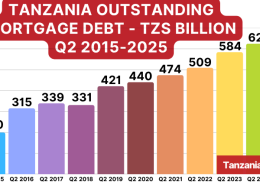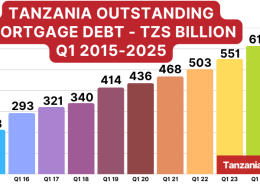Sunday Ndamugoba, Lead Counsel – Trademarks and Patents at ABC Attorneys Tanzania, explains the importance of Intellectual Property (IP) rights in Tanzania’s construction sector.
What is interesting in Tanzania is the attitude to IP that exists between sectors such as manufacturing, film, where there are major players who lobby in favor of strong IP protection in those areas rather than in construction or real estate, which is characterized by a more laid-back attitude.
This could be attributed to the notion that the discussion of IP, a form of intangible asset, does not belong in the context of construction agreements or real estate transactions.
However, one would be surprised at the knowledge that IP issues are especially relevant wherever designs, methodologies and analytical data support the goods and services being delivered. Construction agreements more specifically directly involve these factors.
The term “Intellectual Property” broadly encompasses discrete categories such as copyright, patent, trade-mark and industrial design, as well as general categories such as trade secrets, proprietary methodologies and confidential information.
Commercial value is derived from IP by controlling its use and being able to monetize its outcomes.
In other words, where creativity, knowledge or experience can be captured and applied to produce valuable results, the discussion necessarily involves IP.
Tanzania has several legislations pertaining to IP such as the Trade and Service Marks Act, Cap. 326 which governs trade and service marks, the Patents (Registration) Act, Cap. 217 which governs patents, the Copyright and Neighbouring Rights Act, Cap. 218 which governs copyright issues, and the Merchandise Marks Act for combating counterfeiting business.
Zanzibar has its own laws in relation to IP particularly the Zanzibar Industrial Property Act, 2008 for protection and registration of patents, trade and service marks, industrial designs, geographical indications as well as combating counterfeiting.
To shed more light on the IP aspects, construction is mainly categorized into two classes:
- Class 37 includes mainly services rendered by contractors or subcontractors in the construction or making of permanent buildings, as well as services rendered by persons or organizations engaged in the restoration of objects to their original condition or in their preservation without altering their physical or chemical properties;
- Class 39 (e.g. transportation by railroad).Goods such as building materials for construction work are registered as follows: Metal goods are registered as goods of Class 6 (e.g. metal construction-designated materials) and non-metal goods are registered as goods of Class 19 (e.g. plastic construction-designated materials). In addition, vehicles for use in construction are classified as those of Class 12 (e.g. dump trucks).
It’s true that the construction industry has been comparatively lethargic in embracing IP rights. Buildings can contain innovations which, in any other industry, the author would rush to patent or register. But construction seems unexcited by the availability of such ‘protection’ hence more relaxed.
However, copyright is commonly at issue where construction services are provided. For example, when a design drawing is completed, whether in hard copy or digital format, copyright immediately attaches to that drawing as a “work”.
Copyright is the exclusive right to reproduce a work and to derive commercial benefit there from. The law provides guidance as to who owns the copyright attaching to a work. The owner is most often the author of the work or the author’s employer if the work was created within the scope of employment duties.
The copyright owner holds certain “proprietary rights” in the work and can deal with those rights just as an owner may deal with any hard asset.
Given that significant resources may have been invested in creation of the work, from specialized CAD software to the general overhead costs of any business, a copyright owner should be aware of and seek to exert control over its intangible asset.
Well, some but few are aware of the importance of claiming IP rights and it is vital for contractors to be very cautions of the contracts they sign.
It is possible for a construction agreement to compel a change in copyright ownership without accounting for the inherent value lost to the first owner.
For instance, a contractual term could read:
“The Contractor acknowledges and agrees that all Contractor Documents developed by the Contractor in connection with the Project Work shall become the property of the Project Owner as they are prepared […] The Contractor shall keep the Project Owner advised and updated on the status and specific location of all Contractor Documents and the Contractor shall provide copies thereof to the Project Owner upon demand.
Assuming this contractual term was accepted, the Contractor, as first owner of the copyright attaching to the Contractor Documents, would lose its ability to use, reproduce or deal with the Contractor Documents in any way outside of the particular Project.
Depending on the contents of the Contractor Documents, such a restriction on future use by the Contractor could prove to be costly, inconvenient or even prohibitive to commercial gain outside of the particular Project. Rights to continued use outside of this project, whether limited or expansive in scope, should be part of a Contractor’s legal strategy.”
Some would argue that the lack of awareness is a symptom of a broader apathy to research and development especially in African countries like Tanzania.
Certainly, it seems true that whilst other industries such as IT have seen technological advances which would render a practitioner from the 1950’s open jawed, the construction sector sometimes seems to move more slowly.
I would say a radical change of approach for the industry is needed. It is important to be aware of IP issues in the construction context just as one would pay attention to the management of assets like bulldozers and excavators.
Focus should be placed on commercial value of such intangible assets, for both the short and long term, so that no investment is wasted.
I welcome those in the real estate and construction industry to look at this with a positive eye and perhaps engage more on this side of the law that aims to protect their investments not just for today but tomorrow as well. IP is vital in the modern economy.
ABC Attorneys Tanzania: Contact Details
Capital Plaza,
2nd Flr, Mwai kibaki rd,
P.O.BOX 105722,
Dar es salaam, Tanzania (EA)
Tel. +255 688609931
Fax. +255 713055195
Mob. +255713055195











